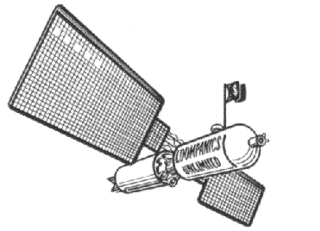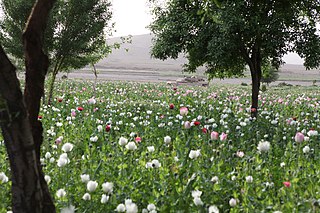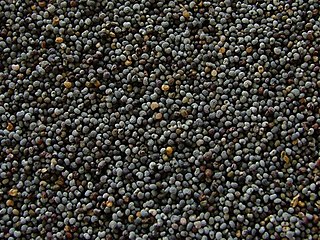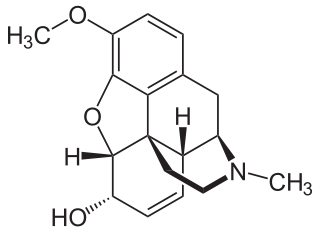
Dextromethorphan, or DXM, a common active ingredient found in many over-the-counter cough suppressant cold medicines, is used as a recreational drug and entheogen for its dissociative effects. Street names include Brownies, Dextro, Drix, Gel, Groove, Lean, Mega-perls, Poor man's ecstasy, Poor man's PCP, Red devils, Robo, Rojo, Rome, Skittles, Sizzurp, Triple Cs, Sky and Velvet.

Heroin, also known as diacetylmorphine and diamorphine among other names, is a morphinan opioid substance synthesized from the dried latex of the opium poppy; it is mainly used as a recreational drug for its euphoric effects. Heroin is used medically in several countries to relieve pain, such as during childbirth or a heart attack, as well as in opioid replacement therapy. Medical-grade diamorphine is used as a pure hydrochloride salt. Various white and brown powders sold illegally around the world as heroin are routinely diluted with cutting agents. Black tar heroin is a variable admixture of morphine derivatives—predominantly 6-MAM (6-monoacetylmorphine), which is the result of crude acetylation during clandestine production of street heroin.

Opium is dried latex obtained from the seed capsules of the opium poppy Papaver somniferum. Approximately 12 percent of opium is made up of the analgesic alkaloid morphine, which is processed chemically to produce heroin and other synthetic opioids for medicinal use and for the illegal drug trade. The latex also contains the closely related opiates codeine and thebaine, and non-analgesic alkaloids such as papaverine and noscapine. The traditional, labor-intensive method of obtaining the latex is to scratch ("score") the immature seed pods (fruits) by hand; the latex leaks out and dries to a sticky yellowish residue that is later scraped off and dehydrated.

Laudanum is a tincture of opium containing approximately 10% powdered opium by weight. Laudanum is prepared by dissolving extracts from the opium poppy in alcohol (ethanol).

A cough is a sudden expulsion of air through the large breathing passages which can help clear them of fluids, irritants, foreign particles and microbes. As a protective reflex, coughing can be repetitive with the cough reflex following three phases: an inhalation, a forced exhalation against a closed glottis, and a violent release of air from the lungs following opening of the glottis, usually accompanied by a distinctive sound.

Cold medicines are a group of medications taken individually or in combination as a treatment for the symptoms of the common cold and similar conditions of the upper respiratory tract. The term encompasses a broad array of drugs, including analgesics, antihistamines and decongestants, among many others. It also includes drugs which are marketed as cough suppressants or antitussives, but their effectiveness in reducing cough symptoms is unclear or minimal.

Papaver rhoeas, with common names including common poppy, corn poppy, corn rose, field poppy, Flanders poppy, red poppy, and Odai, is an annual herbaceous species of flowering plant in the poppy family Papaveraceae. It is native to north Africa and temperate Eurasia and is introduced into temperate areas on all other continents except Antarctica.

A muffin or bun is an individually portioned baked product; however, the term can refer to one of two distinct items: a part-raised flatbread that is baked and then cooked on a griddle, or a quickbread that is chemically leavened and then baked in a mold. While quickbread "American" muffins are often sweetened, there are savory varieties made with ingredients such as corn and cheese, and less sweet varieties like traditional bran muffins. The flatbread "English" variety is of British or other European derivation, and dates from at least the early 18th century, while the quickbread originated in North America during the 19th century. Both types are common worldwide today.
James Thaddeus Goad is an American author and publisher. Goad co-authored and published the zine ANSWER Me! and The Redneck Manifesto.

Loompanics Unlimited was an American book seller and publisher specializing in nonfiction on generally unconventional or controversial topics. The topics in their title list included drugs, weapons, survivalism, anarchism, sex, conspiracy theories, and so on. Many of their titles describe some kind of illicit or extralegal actions, such as Counterfeit I.D. Made Easy and Opium for the Masses, while others are purely informative, such as Uninhabited Ocean Islands, How to Buy Land Cheap and The Muckraker's Manual.

Papaver somniferum, commonly known as the opium poppy or breadseed poppy, is a species of flowering plant in the family Papaveraceae. It is the species of plant from which both opium and poppy seeds are derived and is also a valuable ornamental plant grown in gardens. Its native range was east of the Mediterranean Sea, but has since been obscured and vastly expanded by introduction and cultivation from ancient times to the present day, being naturalized across much of Europe and Asia.
Paladin Press was a book publishing firm founded in 1970 by Peder Lund and Robert K. Brown. The company published non-fiction books and videos covering a wide range of specialty topics, including personal and financial freedom, survivalism and preparedness, firearms and shooting, various martial arts and self-defense, military and police tactics, investigation techniques, spying, lockpicking, sabotage, revenge, knives and knife fighting, explosives, and other "action topics". Sometimes described as the "most dangerous publisher in the world", it was sued over several murders connected to one of its books, and ceased operations in January 2018.

Afghanistan has long had a history of opium poppy cultivation and harvest. As of 2021, Afghanistan's harvest produces more than 90% of illicit heroin globally, and more than 95% of the European supply. More land is used for opium in Afghanistan than is used for coca cultivation in Latin America. The country has been the world's leading illicit drug producer since 2001. In 2007, 93% of the non-pharmaceutical-grade opiates on the world market originated in Afghanistan. By 2019 Afghanistan still produced about 84% of the world market. This amounts to an export value of about US$4 billion, with a quarter being earned by opium farmers and the rest going to district officials, insurgents, warlords, and drug traffickers. In the seven years (1994–2000) prior to a Taliban opium ban, the Afghan farmers' share of gross income from opium was divided among 200,000 families.
You Are Going to Prison is a non-fiction book by Jim Hogshire. It is a practical guide for those who are facing their first experience with incarceration. In 2006, it was loosely adapted into the film Let's Go to Prison.

Poppy seed is an oilseed obtained from the poppy plant. The tiny, kidney-shaped seeds have been harvested from dried seed pods by various civilizations for thousands of years. It is still widely used in many countries, especially in Central Europe and South Asia, where it is legally grown, used in food products and sold in shops. The seeds are used whole or ground into meal as an ingredient in many foods – especially in pastry and bread – and they are pressed to yield poppyseed oil.

Codeine is an opiate and prodrug of morphine mainly used to treat pain, coughing, and diarrhea. It is also commonly used as a recreational drug. It is found naturally in the sap of the opium poppy, Papaver somniferum. It is typically used to treat mild to moderate degrees of pain. Greater benefit may occur when combined with paracetamol (acetaminophen) or a nonsteroidal anti-inflammatory drug (NSAID) such as aspirin or ibuprofen. Evidence does not support its use for acute cough suppression in children. In Europe, it is not recommended as a cough medicine in those under 12 years of age. It is generally taken by mouth. It typically starts working after half an hour, with maximum effect at two hours. Its effects last for about four to six hours. Codeine exhibits abuse potential similar to other opioid medications, including a risk of addiction and overdose.
Opium and Romanticism are well-connected subjects, as readers of Romantic poetry often come into contact with literary criticisms about the influence of opium on its works. The idea that opium has had a direct effect on works of romantic poetry is still under debate; however, the literary criticism that has emerged throughout the years suggests very compelling ideas about opium and its impact on Romantic texts. Usually these criticisms tend to focus on poets such as Samuel Taylor Coleridge, Thomas De Quincey and George Crabbe.
The Great Binge is a 21st-century neologism, coined by amateur historian Gradus Protus van den Belt, describing the period in history covering roughly 1870 to 1914.

The Poppy War is a 2018 novel by R. F. Kuang, published by Harper Voyager. The Poppy War, a grimdark fantasy, draws its plot and politics from mid-20th-century China, with the conflict in the novel based on the Second Sino-Japanese War, and an atmosphere inspired by the Song dynasty. A sequel, The Dragon Republic, was released in August 2019, and a third book, The Burning God was released November 2020.












